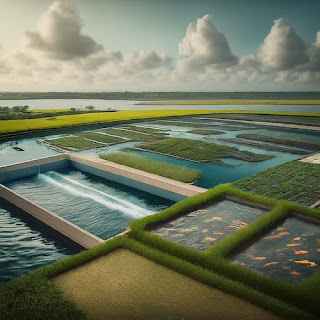A Blueprint for Bangladesh
Hydrokinetic Power Generation with Integrated Aquatic Farms: A Blueprint for Bangladesh
Understanding the Concept
The concept involves harnessing the kinetic energy of river currents to generate electricity through underwater turbines. Simultaneously, floating platforms above these turbines are utilised for aquaculture, cultivating fish and other aquatic organisms. This integrated system offers a dual benefit: clean energy production and sustainable food cultivation.
Application in Bangladesh
Bangladesh, with its extensive river network, is uniquely positioned to capitalise on this technology. The abundant river flow can power the turbines, while the fertile riverine ecosystem provides ideal conditions for aquaculture.
New Invention: Auto-Rearing Fish Technology
- Automated Feeding: Employing sensors to monitor fish growth and nutrient requirements, automated feeding systems can dispense appropriate quantities of feed, optimising fish health and growth.
- Water Quality Control: Real-time monitoring of water parameters (temperature, pH, dissolved oxygen) and automated adjustment of water conditions can create optimal environments for fish.
- Disease Prevention: Early detection systems for fish diseases, coupled with automated medication dispensers, can prevent outbreaks and reduce mortality rates.
- Harvest Optimisation: Predictive models can forecast optimal harvest times based on fish size and market demand, maximising yield and profitability.
Sustainable Gardening Practices for Fish Feed
- Aquaponics Integration: Cultivating nutrient-rich plants on the floating platforms to provide organic feed for the fish, creating a closed-loop system.
- Indigenous Aquatic Plants: Utilising locally available aquatic plants as a sustainable feed source, reducing reliance on external inputs.
- Feed Optimisation: Researching optimal feed formulations to maximise fish growth while minimising environmental impact.
Monitor and Maintain Sustainable Transportation: Self-Sailing Boats
- Solar and Wind Power: Equipping boats with solar panels and wind turbines to reduce reliance on fossil fuels.
- Autonomous Navigation: Developing autonomous navigation systems for efficient and safe operation, especially in challenging river conditions.
- Cargo Optimisation: Designing boats to efficiently transport aquaculture products and other goods, minimising fuel consumption.
- Traditional Boat Modernisation: Incorporating modern technologies into traditional boat designs to enhance performance and sustainability.
Future Benefits
- Energy Independence: Reduced reliance on fossil fuels and increased energy security for Bangladesh.
- Food Security: Increased fish production to address protein deficiency and malnutrition.
- Environmental Benefits: Reduced carbon emissions, improved water quality, and habitat restoration.
- Economic Growth: Creation of new jobs and industries related to aquaculture, renewable energy, and technology.
Challenges and Solutions
- Initial Investment: High upfront costs for technology and infrastructure can be mitigated through government subsidies and international partnerships.
- Environmental Impact: Careful site selection, environmental impact assessments, and mitigation measures are essential to minimise negative impacts.
- Technology Transfer: Collaborating with research institutions and technology providers to develop and transfer appropriate technologies.
- Community Engagement: Involving local communities in project planning and implementation to ensure social acceptance and benefits.
DIY Inventions
- Low-cost water quality sensors: Develop affordable sensors to monitor water parameters for small-scale aquaculture.
- Solar-powered aerators: Create solar-powered devices to oxygenate fish ponds.
- Fish feed supplements: Experiment with locally available ingredients to create cost-effective and nutritious fish feed supplements.
- Boat optimisation: Explore ways to improve the efficiency of traditional boat designs using simple modifications.
By addressing these challenges and leveraging the potential of this integrated system, Bangladesh can achieve significant progress in sustainable development and improve the livelihoods of its people.




